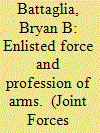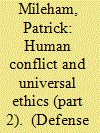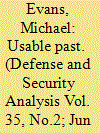| Srl | Item |
| 1 |
ID:
121913


|
|
|
| 2 |
ID:
144748


|
|
|
|
|
| Summary/Abstract |
This second part of the review article begins with a definition of military power, when and how it should be used. From a large number of authors, “moral forces” are linked to “codes of conduct”, and the fundamental understandings about the “profession of arms”, based on “fiduciary trust”, “covenanted” service and professional and personal “conscience”. The article covers what authors have written about “culture” and the ethics of “technology” devices and systems, including “cyber” warfare. It concludes with recognition of the increase in ethical sensitivity in this century which is characterized by a phenomenon, the crises of “identity”, personal, national and global.
|
|
|
|
|
|
|
|
|
|
|
|
|
|
|
|
| 3 |
ID:
165360


|
|
|
|
|
| Summary/Abstract |
The most effective way for the Western profession of arms to use history is to disavow the purism and narrow specialisation of today’s academia in favour of developing a contemporary approach to the subject. The latter aims to foster a range of applied diagnostic skills that transcend the temporal dimensions of past, present, and future. A contemporary approach to history for military professionals emphasises the use of inter-disciplinary war studies to enhance policy relevance. In any defense and security organisation, history must be usable in the sense of providing cognitive and interpretative skills for probing relationships between possibility and actuality, between experience and expectation, and between singularity and repetition. Using history to examine such dialectical interconnections is particularly valuable when military establishments confront their essential task of analyzing emerging trends in the future of war.
|
|
|
|
|
|
|
|
|
|
|
|
|
|
|
|